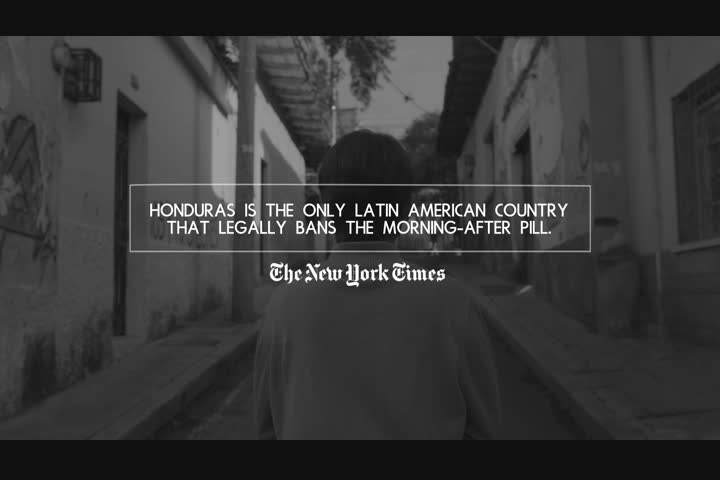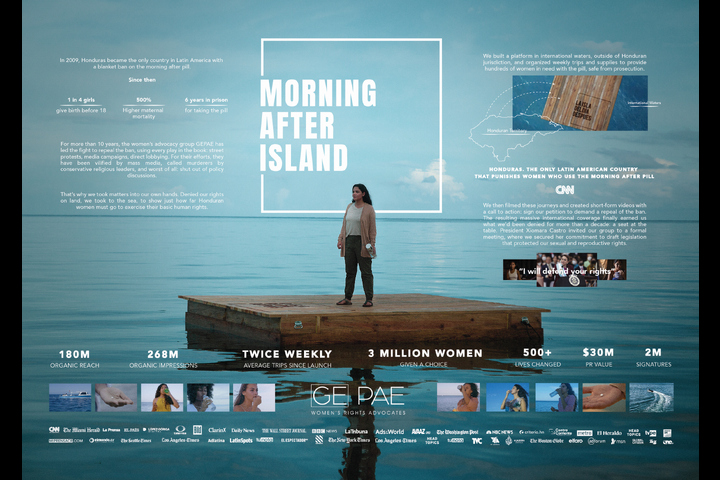London International Awards
2022 Winners and Finalists
Grand LIA
Creativity In PR Public Service/Social Responsibility
| Entrant: | Ogilvy Honduras, Tegucigalpa |
| Brand: | Grupo Estratégico PAE |
| Title: | "Morning After Island" |
| Corporate Name of Client: | Grupo Estratégico PAE |
| Client President: | Jinna Rosales |
| Agency: | Ogilvy Honduras, Tegucigalpa |
| Agency Chief Executive Officer: | Eduardo Ching |
| Worldwide Chief Creative Officer: | Liz Taylor |
| Regional Chief Creative Officer - Ogilvy Latina: | Jessica Apellaniz |
| Executive Creative Director: | Andrés Villalobos |
| Creative Directors: | César Chinchilla/Wanda Calix/Sebastián Bullorini |
| Copywriter: | Ángel Barahona |
| Agency Video Editor: | Donaldo Argueta |
| Global Director of Creative Excellence: | Harley Saftler |
| Regional Director of Creative Excellence - Ogilvy Latina: | Adriana Weinberg |
| Regional Communications Director: | Marina Piacentini |
| Agency Strategy Director: | Alan Cruz |
| Agency Account Director: | Ericka Coello |
| Agency Corporate Communications Director: | Edgardo Melgar |
| Agency Public Relations Director: | Jimena Andino |
| Production Company: | 14 al Centro Latam, Tegucigalpa |
| Production Managing Director: | Julián Maira |
| Senior Executive Producer: | Luis Flores Alvarenga |
| Post-Production Company: | Deseif, Madrid |
| Executive Post-Producer: | Federico Calderón |
| Post-Producers: | Miguel Mateos/Manuel Gavilán |
| Music Production Company: | Garage Film |
| Artist: | Max Chaves |
Written Brief:
The message: Honduras is the only country in Latin America that bans the morning after pill, and this has to change. By working with selected social activists from around the world, we created a newsworthy story to pitch to our international media partners, breaking the Honduran media establishment’s wall of silence and reaching the person with the power to effect change: the Honduran President.
BACKGROUND 13 years ago, Honduras became the only country in Latin America to ban the morning after pill. Already one of the most conservative countries in the region, this single act represented a massive step backwards for women’s rights and wellbeing, with predictable results: Since then, 330,000 underage girls have become mothers.
Today, one out of every four Honduran women and girls will become pregnant before turning 18, fully half raped by the men closest to them.
GE PAE is a non-governmental organization that has fought for over a decade to repeal the prohibition, facing serious headwinds: no media budget, no support from the private sector, zero institutionalized sexual health education (allowing the spread of constant misinformation and cultivating taboo), and a conservative national media in bed with the same religious leaders that call women murderers and death cultists when they ask for basic human rights.
INSIGHT AND CREATIVE IDEA How could we provide a solution for desperate women, without risking our freedom? In the end, the insight was simple: if our rights are denied in our own homeland, why not go where no government or establishment has the power to stop us?
After conferring with civil rights legal experts, we decided to look towards international waters.
So came the idea for the Morning After Island. A platform where we could take the morning after pill without fear of prosecution. Where we could raise our voices, be seen and heard by the world, with no one to silence us. Where we could build support and pressure our government for change without retaliation.
STRATEGY First, we would build the platform, safely anchored in international waters outside of Honduran jurisdiction, and organize regular trips to provide women with a pill— but this was only a short-term solution.
Our objective was to pressure the government to repeal the law, and for that, we needed international mass media attention. We decided to focus on the compelling stories of the individual women who used the platform.
We would film these journeys and create short-form videos designed to be irresistible for sharing, with a simple call to action: sign our petition. On digital, our target audience was Millennials and Gen Z, selected for their progressive values and responsiveness to meaningful content.
By building the conversation in this way, our action would quickly become newsworthy, allowing us to expand our reach even further by pitching to traditional newsmedia outlets with a press release, interviews, and multimedia assets.
EXECUTION: We built the platform and scheduled regular voyages free of cost to any woman who needed the pill. By bus, by car, and by boat, women in need were given the choice they’d been denied by the government. We then produced the first short video with a female rights activist.
In preparation, our media team pitched the story to more than fifty news media outlets curated for their strong stances on social issues, as well as dozens of digital media platforms in Latin America, the US, and Europe.
Less than a week after the first video launched, influencers from the US to Argentina to India were calling on their millions of followers to show their support.
This initial virality earned coverage from CNN International; from there, the momentum became unstoppable. We’d achieved our main goal: this issue could no longer be silenced by traditional Honduran media or its government officials.
RESULTS: Our message was amplified by 112 media outlets in 14 countries, with an audience of 180 million and $30 million in earned media.
We successfully turned this spike in global awareness to conversions, gathering more than 2 million signatures from around the world demanding that the Honduran government repeal the ban.
This mass media attention finally brought about concrete progress. The President met with us on International Woman’s Day, where we discussed the issue of the morning after pill. Simultaneously, an all-women session of Congress addressed the many additional problems facing Honduran women.
By day’s end, the government had committed to systemic change: the formation of a new Ministry of Women and a legislative proposal repealing the ban on the morning after pill. In the meantime, the Morning After Island has changed 500+ lives and remains the only choice for more than 3 million Honduran women.


